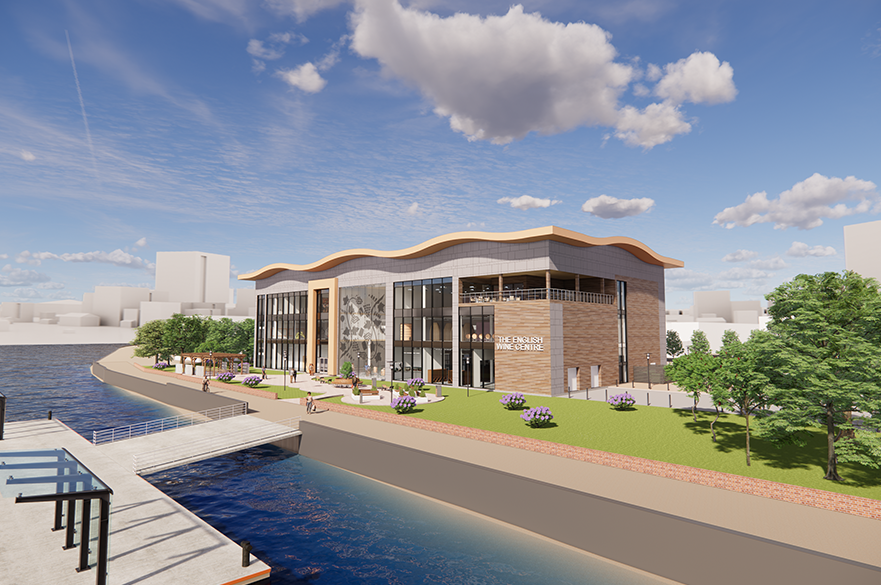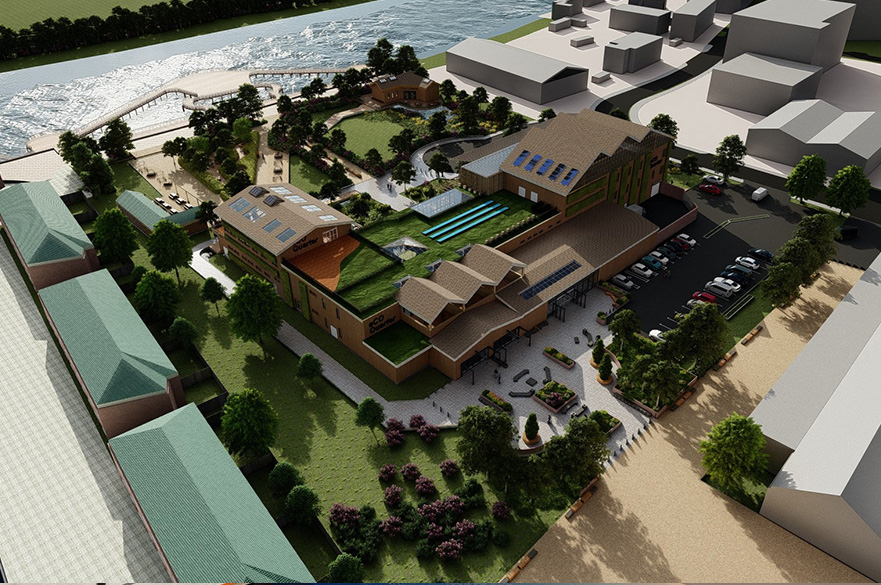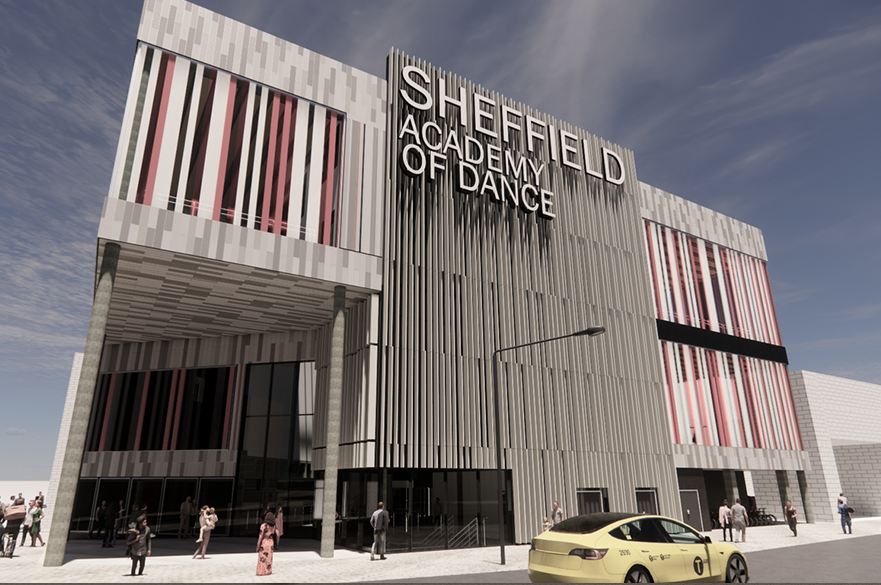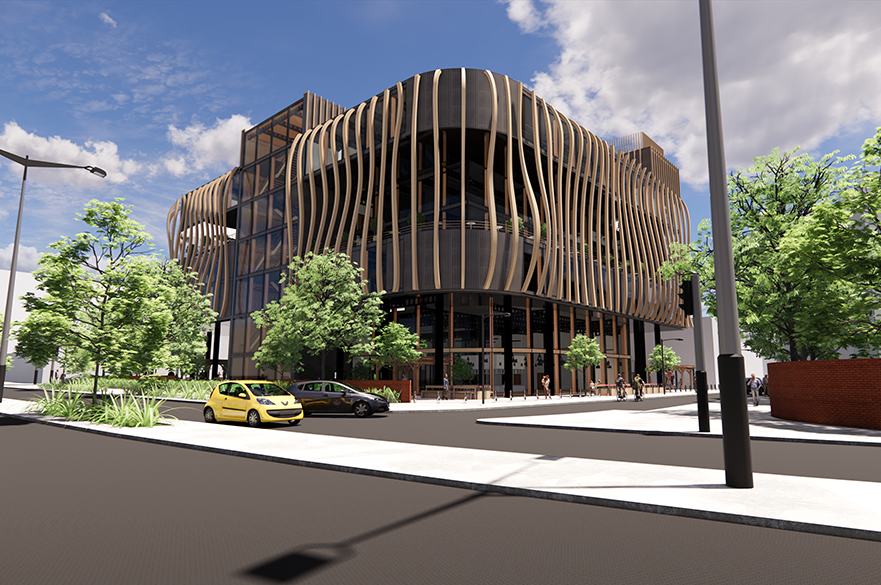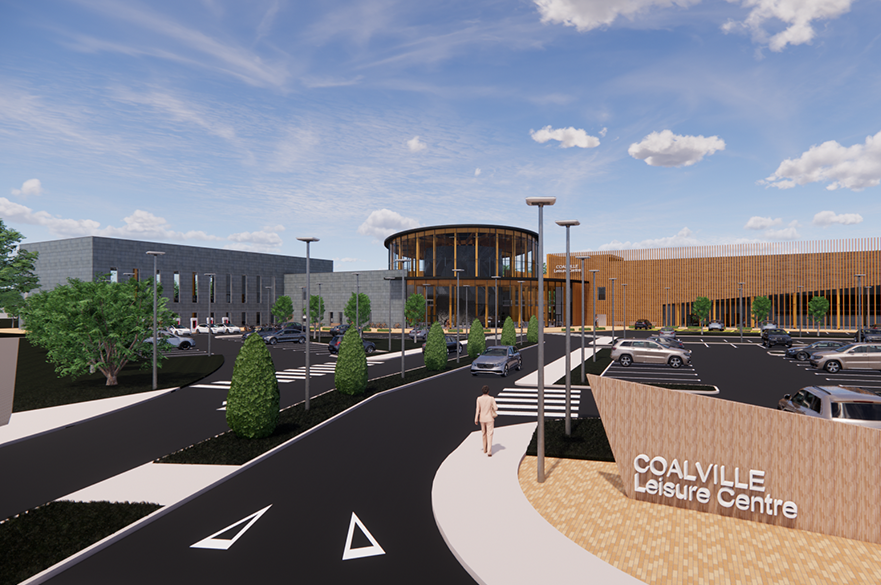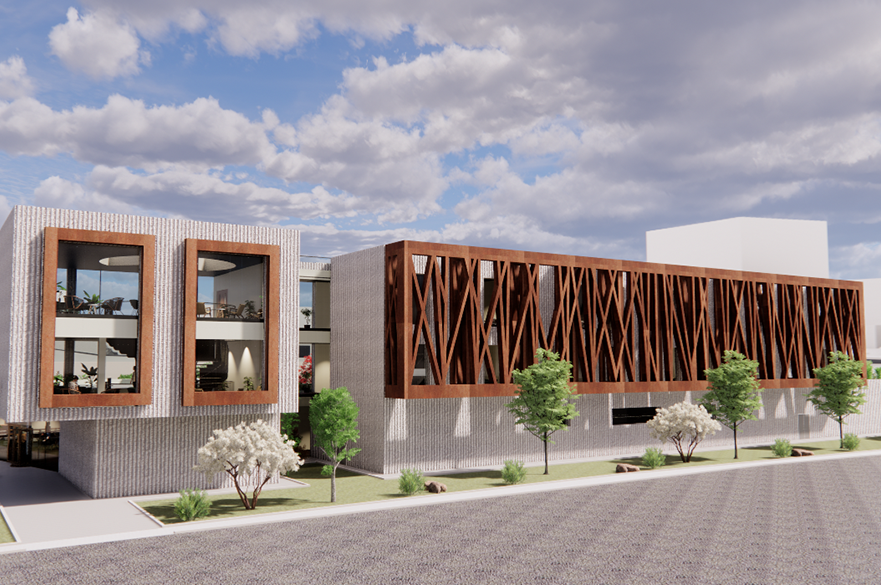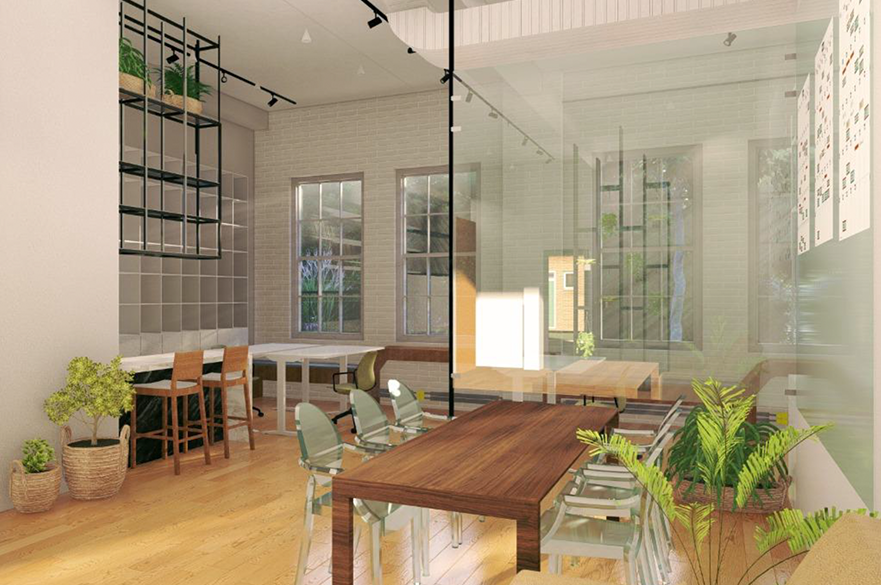10
Architectural Technology BSc (Hons)
- Level(s) of Study: Undergraduate
- Typical Offer: 104 - 112 UCAS tariff points
- UCAS Code(s): K101 (with placement year) / K130 (full-time)
- Start Date(s): September 2023
- Duration: Four years full-time with placement year, three years full-time
- Study Mode(s): Full-time / Sandwich
- Campus: City Campus
Introduction:
This professionally focused course is your gateway to a career in the architecture industry. You’ll explore how buildings are created, procured, constructed and managed, and develop a practical and imaginative approach to design through project-based learning.
As a specialist in architectural technology, you’ll be the link between concept and reality. You’ll learn to identify, assess and challenge client and user requirements, translating ideas and possibilities into effective, practical and sustainable building solutions.
Based in our Grade II* listed Gothic Revival style Arkwright building, you’ll study in a studio culture that reflects modern practice. Specialist facilities and expert guidance from staff will prepare you for a successful graduate career from day one.
Explore the work of our graduating students in our Student Showcase.
Compare our courses to find out how this course differs from BArch (Hons) Architecture and BA (Hons) Interior Architecture and Design.
-
2nd most sustainable university in the world (UI GreenMetric World University Rankings 2023).
-
93% of our Architecture sandwich undergraduates with a first degree are in a ‘High Skilled’ role 15 months of finishing their degrees (latest Graduate Outcomes Survey 2020/21).
-
NTU is ranked joint 6th in the UK for Architecture Graduate Prospects (Complete University Guide 2024).
-
Gain vital skills and experience in the workplace by undertaking a one-year placement on our sandwich route. Previously students have spent their placements at Benoy, Foster + Partners, Gensler and Pozzoni Architecture Ltd.
What you’ll study
The first two years of the course focus on the introduction and integration of technological and design theory into practice.
The final year modules are designed to provide opportunities to develop your professional portfolio of work. All modules have been designed to meet the QAA subject benchmarks and CIAT or CIOB course learning outcomes.
Year One
- Technology and Design Studio 1 (60 credits)
- Construction Technology 1 (20 credits)
- Architecture in Context (20 credits)
- Integrated Design Communication 1 (20 credits)
Year Two
- Technology and Design Studio 2 (60 credits)
- Construction Technology 2 (20 credits)
- Integrated Design Communication 2 (20 credits)
- Professional Development and Employability (20 credits)
Year Three
- Sandwich placement year or Study abroad
Final Year
- Technology and Design Studio 3 (60 credits)
- Integrated Design Communication 3 (20 credits)
- Contract Admin and Professional Practice (20 credits)
- Research Project (20 credits)
- *Exhibiting as part of the Degree Shows
Year One
Technology and Design Studio 1 (60 credits)
- This module is an exploration of architectural design principles. Through a series of projects carried out individually and in small groups, you'll develop the basic skills required by architectural technologists and be introduced to the concept of studio-based learning. You'll work on a number of projects throughout the year, exploring the technical aspects associated with building environments.
- The content of this module focuses primarily on the nature of domestic scale building design and construction projects. You'll look at the range of factors that influence building design development and learn how to make a critical and reflective appraisal of solutions to construction problems.
Construction Technology 1 (20 credits)
- This module will introduce you to a range of technical, practical and environmental principles involved in the making of structures.
- It will provide you with a framework for understanding the environmental impact of buildings, in terms of both human wellbeing and the creation of a sustainable built environment.
Architecture in Context (20 credits)
- This module looks at how wider social issues – such as politics, the economy and technology – influence architecture, both throughout history and in current times.
- You'll learn to recognise and engage with architectural responses to these influences by studying a variety of historical and cultural themes within an architectural framework.
Integrated Design Communication 1 (20 credits)
- This module will introduce you to a range of design communication skills and give you a basic understanding of building information modelling (BIM), through the application of hand drawing, model making, and computer-aided design (CAD) software.
- You'll be encouraged to communicate your ideas through a range of professionally recognised conventions, preparing you for the expectations of graduate employers.
Year Two
Technology and Design Studio 2 (60 credits)
- This module challenges you to further develop knowledge gained during the previous year of study and apply skills to a number of larger-scale project-based scenarios, focusing on macro and micro issues associated with integrated design with technology.
- Concentrating on non-domestic buildings, you'll establish client requirements and user factors, identify challenges and preferences in order to the develop the design brief and formulate proposals that respond to it. Through analysing performance requirements for new and existing buildings, together with quality control mechanisms, you'll determine and evaluate appropriate options for structures, materials and environmental services.
- On a practical level, the module will introduce knowledge and skills in locating and acquiring development sites and existing buildings, as well as surveying, measuring, recording and evaluating information. Further consideration towards the relevant legislation, legal and regulatory frameworks, current building regulation requirements and health and safety aspects will inform inclusive and sustainable building proposals.
Construction Technology 2 (20 credits)
- This module will further your understanding of the technical, practical and environmental principles of architectural design.
- It will familiarise you with a number of alternative solutions to enable you to meet the technical and human demands of architectural projects. You'll also further develop your critical understanding of the environmental impacts of design decisions.
Integrated Design Communication 2 (20 credits)
- This module will develop your design communication skills and understanding of building information modelling (BIM), through the application of CAD software, environmental modelling, and – subsequently – visualisation techniques and challenges using digital media.
Professional Development and Employability (20 credits)
- This module provides the opportunity to develop skills in the design, planning and implementation of development projects. You will gain a further understanding and appreciation of design character, the way in which historic and contemporary buildings and spaces are used, and the implications of constraints that apply to today’s construction industry.
- You will examine the public policy realm, market mechanisms and community interest, as well as looking at key graduate skills such as self-management, programming, and job planning.
Year Three
Sandwich placement year
In your third year, you'll have the opportunity to take a year-long, full-time placement. This year in industry will offer you hands-on experience, adding invaluable knowledge and skills to your CV. Many students return to their placement company after graduation, having developed a useful network of contacts within the industry.
Recent placement destinations have included Gensler, Foster + Partners and Michael Dyson Associates, working in roles such as architectural technologist, CAD technician, and BIM assistant.
Successful completion of the placement year leads to an extra qualification – the Diploma in Professional Practice.
Study abroad
If you're studying on our sandwich route you can opt to study abroad for a full academic year, or for a semester This is an optional and additional period of study that complements your degree as an alternative to taking a work placement.
Our NTU Global and student mobility team will support you in finding the right opportunity from one of our many international partners available around the world.
Successful completion of a period of international study will earn you a standalone award – an International Study Certificate (minimum six weeks) or the International Study Diploma (minimum 36 weeks).
Final Year
Technology and Design Studio 3 (60 credits)
- This module enables you to design and technically develop a scheme within the built environment. The module is student-led, offering you the opportunity to focus on a major study project. Your project will be based on a realistic development scenario; you'll assess the development potential, create and present a feasibility study, and produce detailed design proposals. You'll receive support and weekly workshops provided by course staff and external practitioners when appropriate.
- This module brings together all content from the previous modules, integrating research, design, technology, resources management and Building Information Modelling (BIM) into a project based scenario.
- You'll produce a report of your development ideas, illustrated with drawings, models and other electronic techniques. The culmination of the project will be formal public exhibition of your work at the NTU Degree Shows*.
Integrated Design Communication 3 (20 credits)
- This module will provide you with an understanding of the theory and practice of building information modelling and integrated project delivery, and of their application within the construction industry
- You'll develop hands-on skills and experience in generating collaborative design models, and merging models for design coordination and clash detection.
Contract Admin and Professional Practice (20 credits)
- In this module you'll learn about contract administration – the study of construction contracts and practice. Widely used in the industry, you'll find knowledge of construction-related contracts invaluable in your graduate career.
- You'll study key topics relating to the administration of construction-related contracts, and apply the practices and procedures to industry-related scenarios.
Research Project (20 credits)
- This module provides you with the skills and experience to underpin the Technology Design Studio module. The module will cover the elements of research investigation, analysis, argument, construction, critical debate, and presentation of findings.
- Through a series of documents and drawings, you'll be able to clearly demonstrate how your research has informed your major study project. At the end of the module, you'll have completed all the necessary research, including site research; analysed the material; and clearly identified all issues relevant to your design.
*Exhibiting as part of the Degree Shows
In your final year, you'll be invited to display your work as part of NTU's Degree Shows. The events are an opportunity for all final year students studying across NTU's Art and Design-based courses to showcase their work to our network of industry professionals and prospective employers, invited specifically for this purpose.
Don’t just take our word for it, hear from our students themselves
Student Work
Video Gallery
How you’re taught
Course content is delivered through lectures, seminars, tutorials and workshops. You will also be involved in self-directed project work with the support of NOW, our virtual learning environment.
Outside of timetabled sessions you will undertake self-directed independent study. This will include preparing for lectures, researching, completing coursework, developing a portfolio, and directed reading to expand your knowledge.
The course is supported by external professional practitioners, ensuring that your learning is continuously enhanced through exposure to real world perspective. This includes our guest lecture series, where an industry expert is invited to give a guest lecture to expose our students to the work currently happening in architectural technology practices.
Study trips
Field trips and study visits are an important part of your learning. Trips may include site visits and visits to practices, museums, exhibitions and events. Where a trip is mandatory it will be aligned to your modules and inform project work, and substantive costs – including travel and accommodation – will be paid for by the school.
Optional trips may also be organised which can provide additional opportunities to enhance your knowledge and experience. Optional trips may incur a cost to the student. A valid passport and any associated visas will be required for trips outside of the UK.
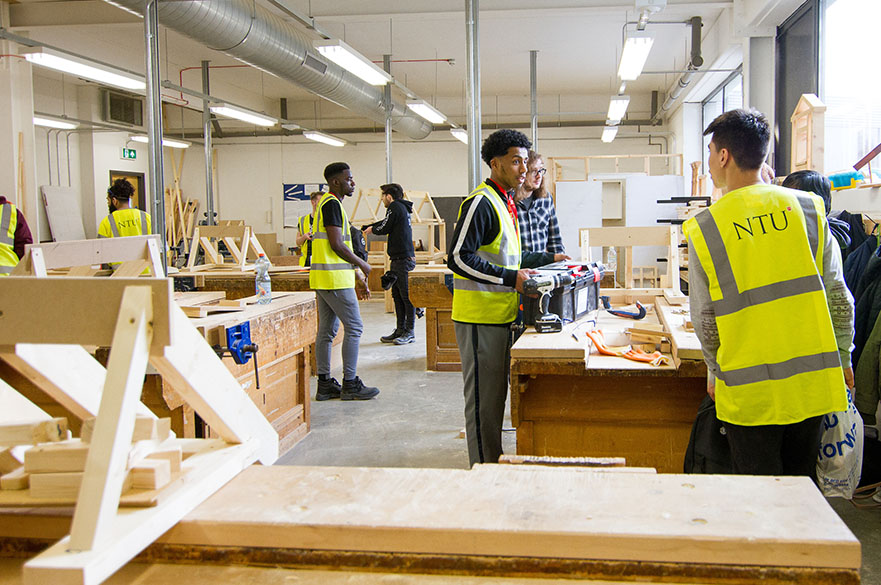
Architectural Technology students during a study trip to Basford Hall
Contact hours
| Year One | Lectures/seminars/workshops | 33% | Independent study | 67% |
|---|---|---|---|---|
| Year Two | Lectures/seminars/workshops | 31% | Independent study | 69% |
| Year Three | Optional placement year | |||
| Year Four | Lectures/seminars/workshops | 28% | Independent study | 72% |
How you’re assessed
You'll be assessed through a range of practical-based methods in the form of coursework. Coursework includes group and individual design projects, reports, presentations to your peers, visual essays and portfolios.
| Year One | Coursework | 100% | ||||
|---|---|---|---|---|---|---|
| Year Two | Coursework | 100% | ||||
| Year Three | Optional placement year | |||||
| Year Four | Coursework | 100% | ||||
Careers and employability
NTU is 1st for the number of UG students studying Architecture, building and planning (HESA, 2021/22).
Our course is designed to prepare you to succeed in the architectural technology industry. Through working on real projects from industry, field work and regularly updated course content, you'll be equipped with skills and experience to carry with you for the rest of your professional career.
Where do Architectural Technology graduates from NTU work?
Many graduates from this course work as architectural designers or architectural technologists. Others work within wider roles in contract management, surveying and estimating. Recent graduate destinations have included:
- Foster + Partners
- Whittam Cox Architects
- Benoy
- Gensler
- Pozzoni Architecture Ltd
Our Employability team
Our expert Employability team will work closely with you at every stage of your career planning, providing personal support and advice. You can benefit from this service at any time during your studies, and for up to three years after completing your course.
Throughout the year, our Employability team runs a series of events specifically for students studying in the School of Architecture Design and the Built Environment. Our Architecture Exchange events bring together current students and prospective employers for an evening of presentations, table discussions and networking. We also run a Property, Design and Construction Fair, offering employers the opportunity to advertise graduate roles to our final year students.
Excellent placement opportunities
By choosing our sandwich (four year) route, you’ll have the opportunity to take a year-long work placement during your studies, giving you the opportunity to gain real experience in industry. The majority of our placement students receive a salary.
Students typically gain placements in architecture companies across the UK and abroad. Recent destinations have included:
- Foster + Partners
- Benoy
- Gensler
- ISG
- CMPG
Professional qualification
Successful completion of the 36 weeks leads to an extra qualification – the Diploma in Professional Practice.
Your year on placement also counts towards Chartership for the Chartered Institute of Architectural Technologists.
Chartered Institute of Architectural Technologists (CIAT)
This course is accredited by CIAT, which is the global membership qualifying body for Architectural Technology. It's a membership organisation representing 10,000 members practicing and studying in the discipline who wish to be professionally recognised.
CIAT accreditation implies that the course has been assessed in terms of content, structure, resources and has met the Institute's requirements. Studying on a CIAT Accredited course makes you part of a worldwide network of professionals and supports you in progressing to Chartered Architectural Technologist (MCIAT) status.
Find out more on the CIAT website.
NTU Enterprise
You'll have the opportunity to turn your ideas into a viable business with help from NTU Enterprise, NTU's purpose-built Centre for Entrepreneurship and Enterprise, a support centre to help students create, develop and grow their own businesses.
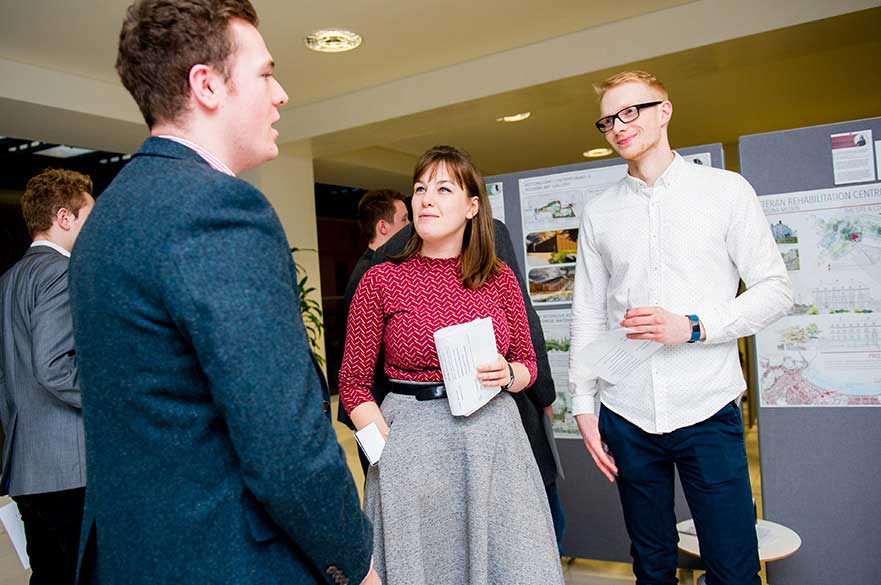
Students networking at our Architecture Exchange event
What our students are doing now
ADBE graduate wins the CIAT National Student Award for Excellence in Architectural Technology
Callum Craske, a BSc (Hons) Architectural Technology graduate, wins the CIAT National Student Award for Excellence in Architectural Technology.
Students win joint top prize at the prestigious CIAT Architectural Technology Awards
Nottingham Trent University wins highest national honour for cultural heritage science research
Campus and facilities
Historic setting, modern practice
Architectural Technology students have their own studio space, based in our Grade II* listed Arkwright building. You'll be supported by our expert team of academic and technical staff through seminars and workshops in this space, which includes desktop computers and desk space.
IT resources
Our IT resource rooms and PC clusters are distributed across our City Campus, with PCs providing access to Microsoft Office, email, web browsing, networked file storage and high-speed online printing services, with a free printing allowance for each student.
We have dedicated computers that have all the software you need to complete your projects. Our teaching team will work with you on a range of industry-standard programmes including REVIT, AutoCAD and Sketchup to develop and realise your designs.
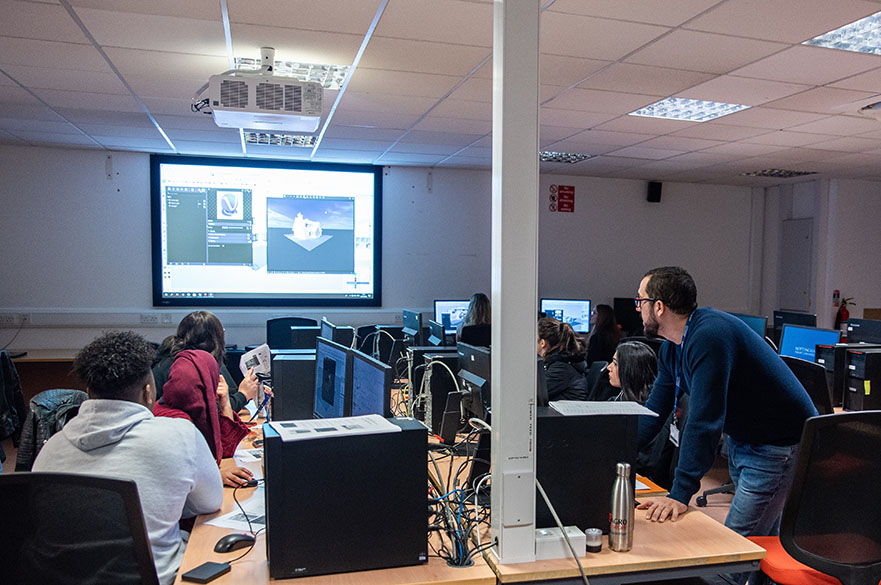
The Construction Collaboration Technology (CCT) room in our Maudslay building
Entry requirements
What are we looking for?
- Standard offer: 112 UCAS Tariff points from up to four qualifications (two of which must be A-level equivalent)
- Contextual offer: 104 UCAS Tariff points from up to four qualifications (two of which must be A-level equivalent)
Contextual offers
A lower offer may be made based on a range of factors, including your background (such as where you live and the school or college you attended), your experiences and individual circumstances (you may have been in care, for example). This is called a contextual offer and we get data from UCAS to make these decisions. NTU offers a student experience like no other and this approach helps us to find students who have the potential to succeed here but who may have faced barriers that make it more difficult to access university. Find out how we assess your application.
Other qualifications and experience
We may also consider credits achieved at other universities and your work/life experience through an assessment of prior learning. This may be for year one entry, or beyond the beginning of a course where applicable, for example, into year 2.
Our Recognition of Prior Learning and Credit Transfer Policy outlines the process and options available for this route.
Meeting our entry requirements
Hundreds of qualifications in the UK have UCAS tariff points attached to specific grades, including A levels, BTECs, T Levels and many more. You can use your grades and points from up to four different qualifications to meet our criteria. Enter your predicted or achieved grades into our tariff calculator to find out how many points your qualifications are worth.
Getting in touch
If you need more help or information, get in touch through our enquiry form
International qualifications
We accept qualifications from all over the world – check yours here:
English language entry requirements
You can meet our language requirements by successfully completing our pre-sessional English course for an agreed length of time, or by submitting the required grade in one of our accepted English language tests, such as IELTS:
Undergraduate preparation courses (Foundation)
If you don’t yet meet our entry requirements, we offer Foundation courses through our partner Nottingham Trent International College (NTIC), based on our City Campus:
Advanced standing (starting your undergraduate degree in year 2 or 3)
You may be able to start your undergraduate course in year 2 or 3 based on what you have studied before. This decision would be made in accordance with our Recognition of Prior Learning and Credit Transfer Policy.
Would you like some advice on your study plans?
Our international teams are highly experienced in answering queries from students all over the world. We also have members of staff based in Vietnam, China, India and Nigeria and work with a worldwide network of education counsellors.
- Complete this simple form to keep in touch with the International Office.
Fees and funding
Preparing for the financial side of student life is important, that’s why we’re here to help - take a look at our fees and funding pages for lots of handy advice and guidance.
Additional costs
Your course fees cover the cost of studies, and include loads of great benefits, such as the use of our library, support from our expert Employability team, and free use of the IT equipment across our campuses.
This course may also incur some additional costs, such as follows:
- Year 1: Drawing equipment and materials £150 (estimate) and printing £50 (estimate)
- Year 2: Drawing equipment and materials £100 (estimate) and printing £100 (estimate)
- Final Year: Drawing equipment and materials £60 (estimate) and printing £350 (estimate)
Our Students’ Union shop and Bonington art shop are great places to pick up drawing and writing equipment and are located right on our City Campus.
Library books
Most study modules will recommend one or more core text books. Book costs vary and further information is available in the University’s bookshop.
Our libraries provide a good supply of essential text books, journals and materials (many of which you can access online) – meaning you may not need to purchase as many books as you might think! There may also be second-hand books available for purchase from previous year students.
Placements
If you're undertaking a placement year, you'll need to budget for accommodation and any travel costs you may incur whilst on placement. Many of our placement students do earn a salary whilst on placement which can help to cover these living costs.
Degree Show
In Final Year, the School will provide infrastructure costs for your Degree Show, including course catalogue and exhibition set-up costs. If you’re selected to exhibit your work at a graduate show, the School will cover the cost of transporting your work, the exhibition stand and event set-up.
Our Building Blocks financial package: supporting you throughout your studies
As a student at the School of Architecture, Design and the Built Environment, you’ll also benefit from our Building Blocks financial package, which aims to help minimise the additional costs of study while you’re here at NTU.
What you’ll receive:
- All of the materials needed for induction workshops and activities, working within our workshops and laboratories.
- Free personal protective equipment (PPE), which usually includes hard-wearing boots, goggles and high-vis vests, to keep you safe on site visits and while working in our workshops.
- Access to the free professional body accreditation, as appropriate for your course.
- £20 pre-paid printing allowance for use at the NTU Print Shops, and library photocopiers. For more details about costs for additional print and copying required over and above the annual allowance please see the Printing, photocopying and scanning information on the Library website.
Getting in touch
For more advice and guidance, you can contact our Student Financial Support Service by calling +44 (0)115 848 2494
Tuition fees for September 2024 entry
Tuition fees are payable for each year that you are at the University. The level of tuition fees for the second and subsequent years of your undergraduate course may increase in line with inflation and as specified by the UK government. Visit our fees page for more information.
Scholarships
We offer scholarships of up to 50% of your tuition fee. You can apply for your scholarship when you have an offer to study at NTU.
Living costs
Get advice on the cost of living as an international student in Nottingham and how to budget:
Paying fees
Find out about advanced payments, instalment plan options and how to make payments securely to the University:
Additional costs
Your course fees cover the cost of studies, and include loads of great benefits, such as the use of our library, support from our expert Employability team, and free use of the IT equipment across our campuses.
This course may also incur some additional costs, such as follows:
- Year 1: Drawing equipment and materials £150 (estimate) and printing £50 (estimate)
- Year 2: Drawing equipment and materials £100 (estimate) and printing £100 (estimate)
- Final Year: Drawing equipment and materials £60 (estimate) and printing £350 (estimate)
Our Students’ Union shop and Bonington art shop are great places to pick up drawing and writing equipment and are located right on our City Campus.
Library books
Most study modules will recommend one or more core text books. Book costs vary and further information is available in the University’s bookshop.
Our libraries provide a good supply of essential text books, journals and materials (many of which you can access online) – meaning you may not need to purchase as many books as you might think! There may also be second-hand books available for purchase from previous year students.
Placements
If you're undertaking a placement year, you'll need to budget for accommodation and any travel costs you may incur whilst on placement. Many of our placement students do earn a salary whilst on placement which can help to cover these living costs.
Degree Show
In Final Year, the School will provide infrastructure costs for your Degree Show, including course catalogue and exhibition set-up costs. If you’re selected to exhibit your work at a graduate show, the School will cover the cost of transporting your work, the exhibition stand and event set-up.
Our Building Blocks financial package: supporting you throughout your studies
As a student at the School of Architecture, Design and the Built Environment, you’ll also benefit from our Building Blocks financial package, which aims to help minimise the additional costs of study while you’re here at NTU.
What you’ll receive:
- All of the materials needed for induction workshops and activities, working within our workshops and laboratories.
- Free personal protective equipment (PPE), which usually includes hard-wearing boots, goggles and high-vis vests, to keep you safe on site visits and while working in our workshops.
- Access to the free professional body accreditation, as appropriate for your course.
- £20 pre-paid printing allowance for use at the NTU Print Shops, and library photocopiers. For more details about costs for additional print and copying required over and above the annual allowance please see the Printing, photocopying and scanning information on the Library website.
Would you like some advice on your study plans?
Our international teams are highly experienced in answering queries from students all over the world. We also have members of staff based in Vietnam, China, India and Nigeria and work with a worldwide network of education counsellors.
Complete this simple form to keep in touch with the International Office.
How to apply
You can apply for this course through UCAS.
As part of your application, you’ll be asked to submit a personal statement explaining your ambitions, skills and experience. You'll have 4,000 characters to impress us – here’s how to make your words count.
Keeping up to date
After you've applied, we'll send you important emails throughout the application process – so check your emails regularly, including your junk mail folder. You can get more information and advice about applying to NTU on our Your Application page.
You can apply for this course through UCAS.
If you are not applying to any other UK universities, you can apply directly to us on our NTU Applicant Portal.
Application advice
Apply early so that you have enough time to prepare – processing times for Student visas can vary, for example. After you've applied, we'll be sending you important emails throughout the application process – so check your emails regularly, including your junk mail folder.
Writing your personal statement
Be honest, thorough, and persuasive – we can only make a decision about your application based on what you tell us:
Would you like some advice on your study plans?
Our international teams are highly experienced in answering queries from students all over the world. We also have members of staff based in Vietnam, China, India and Nigeria and work with a worldwide network of education counsellors.
Complete this simple form to keep in touch with the International Office.
